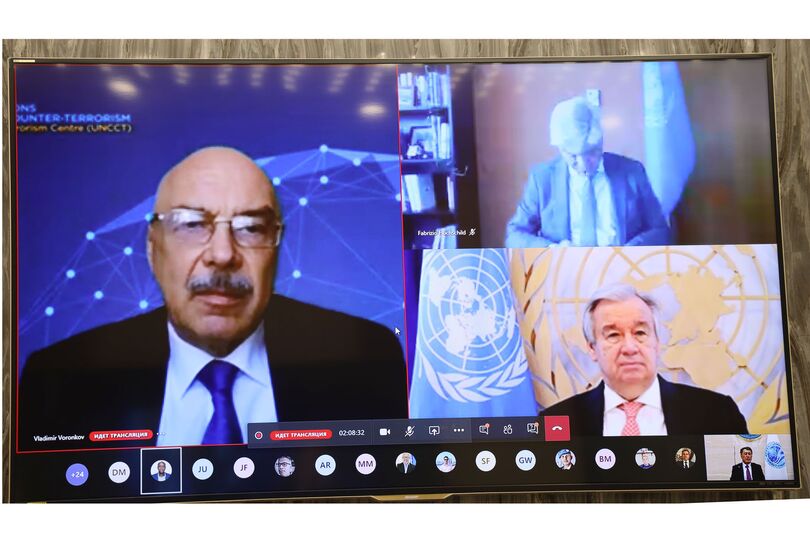On July 6, 2020, SCO Secretary-General Vladimir Norov took part in the opening of Virtual Counter-Terrorism Week at the UN as part of the webinar "Post COVID-19 World: Contours, Pivot Points and Benefits of Multilateral Collaboration."
Speeches at the meeting were made by UN Secretary-General Antonio Guterres, High Representative of the European Union for Foreign Affairs and Security Policy Josep Borrell, President of the Council for Foreign Relations (US) Richard Haass, Executive Director of the United Nations Office on Drugs and Crime Ghada Fathi Waly, Special Adviser to the Secretary-General on the Commemoration of the United Nations' 75th Anniversary Fabrizio Hochschild Drummond, and heads of permanent missions at the UN and other top diplomats.
UN Under-Secretary-General for Counter-Terrorism and Head of the UN Office of Counter-Terrorism (UNOCT) Vladimir Voronkov acted as moderator.
UN Secretary-General Antonio Guterres noted that the coronavirus pandemic revealed the danger emanating from new terrorist threats linked with the use of ICT and biological weapons. He emphasised the need to promote multilateralism to effectively counter these challenges.
UNOCT Head Vladimir Voronkov said that despite a tangible trend towards a reduction in the number of terrorist attacks, it is important to maintain vigilance as regards the changing tactics and instruments used by the terrorists. He said the UNOCT is carrying out over 300 counter-terrorism programmes, thereby making a substantial contribution to the security of 72 states.
UNODC Executive Director Ghada Fathi Waly pointed to the importance of preventive work in penitentiary institutions with a view to countering the spread of violence and radical attitudes there, as well as the COVID-19 coronavirus.
SCO Secretary-General Vladimir Norov said the current socio-economic crisis combined with the expedited transfer to contactless forms of communication, is forming fertile soil for the online spread of destructive ideas among young people. He also noted that "sleeping cells" of terrorists that are involved in propaganda and recruitment may take advantage of the political and economic chaos to promote more aggressive actions.
SCO Secretary-General Vladimir Norov said the current socio-economic crisis combined with the expedited transfer to contactless forms of communication, is forming fertile soil for the online spread of destructive ideas among young people. He also noted that "sleeping cells" of terrorists that are involved in propaganda and recruitment may take advantage of the political and economic chaos to promote more aggressive actions.
In this context, Mr Norov emphasised the need to build up international cooperation on curbing the dissemination of terrorist and extremist ideology in the information space and block sources and channels of funding terrorists and their accomplices, including revenue from drug trafficking and other forms of cross-border crime.
The SCO Secretary-General underscored the importance of consolidating multilateral efforts on countering ICT attacks against government and financial institutions and upgrading the protection of critical infrastructure. He urged the participants to develop universal rules, principles and standards of responsible conduct for states in the information space. Mr Norov also stressed the need to focus efforts on neutralising the biosecurity risks that the UN Secretary-General warned of.
The SCO Secretary-General underscored the importance of consolidating multilateral efforts on countering ICT attacks against government and financial institutions and upgrading the protection of critical infrastructure. He urged the participants to develop universal rules, principles and standards of responsible conduct for states in the information space. Mr Norov also stressed the need to focus efforts on neutralising the biosecurity risks that the UN Secretary-General warned of.
Mr Norov noted that the SCO member states would discuss in detail further measures on countering the above challenges at their forthcoming summit in St Petersburg.
The SCO Secretary-General told the participants about the concern of the SCO member states over the continued activities of foreign terrorists and militants in the northern areas of Afghanistan and expressed the SCO's willingness to work to resolve this problem in the UN and other international venues.
Mr Norov pointed out that the signing of a memorandum of understanding between the SCO RATS and the UNOCT will help strengthen the potential of the SCO countries in implementing the UN Global Counter-Terrorism Strategy.
The SCO Secretary-General brought into focus the importance of counter-terrorism cooperation based on the goals and principles of the UN Charter and universally recognised standards of international law, in which the UN and the Security Council must play a central coordinating role. He noted that an effective struggle against terrorism can only be conducted through inclusiveness, solidarity, and mutual trust and through the leading role and responsibility of government institutions for counter-terrorism policy.
The UN's Virtual Counter-Terrorism Week is being held under the overarching theme of "Strategic and Practical Challenges of Countering Terrorism in a Global Pandemic Environment." This programme of video events, which includes ten webinars and interactive discussions, will run through July 10, 2020.
